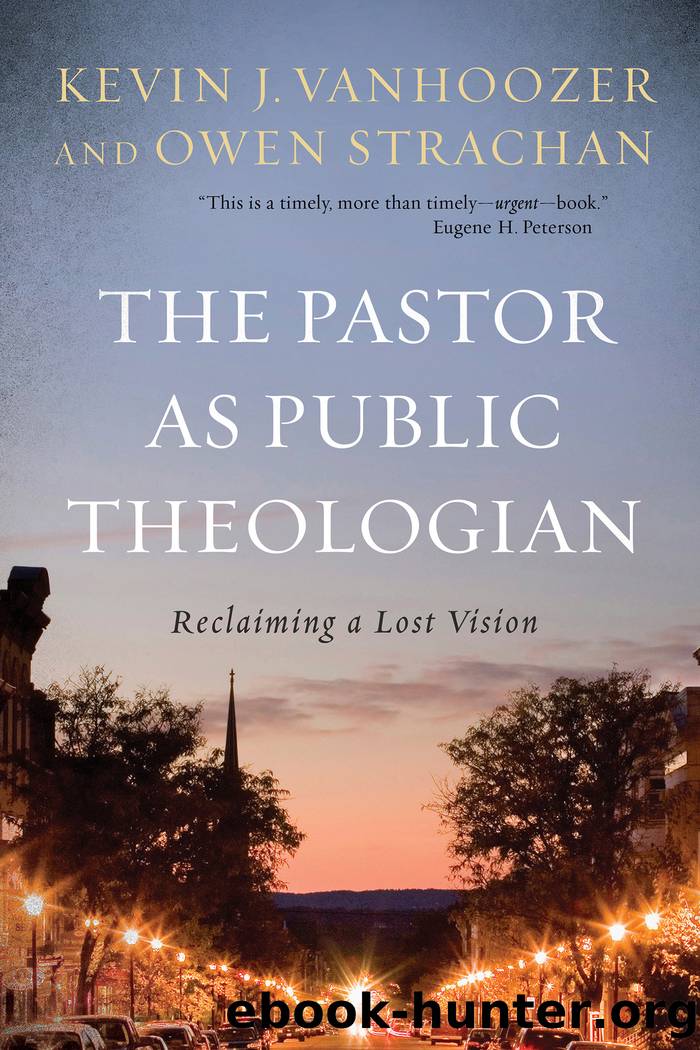The Pastor as Public Theologian by Kevin J. Vanhoozer

Author:Kevin J. Vanhoozer [Vanhoozer, Kevin J. and Owen Strachan]
Language: eng
Format: epub
Tags: Pastoral Ministry/Theology, Christianity and culture, REL074000, REL067000
ISBN: 9781441245724
Publisher: Baker Publishing Group
Published: 2015-06-17T00:00:00+00:00
A Ministry of (New) Life: Theology in the Imperative Mood
The gospel is in the indicative mood. Preaching the good news involves saying what has happened and what is the case: Jesus has died for our sins; God raised Jesus from the dead; Jesus is now the living Lord, to whom the Spirit unites us in faith. Yet the gospel indicativeâwhat is in Christâalso contains a tacit imperative, a demand actively to conform to what is and joyfully participate in what is. And insofar as living into the reality of Christ is a corporate project, we could also speak of the cohortative mood (from Latin co, âtogetherâ + hortari, âencourageâ), whose telltale âLet usâ signals that pastors must heed their own exhortations: âLet us pursue what makes for peace and for mutual upbuildingâ (Rom. 14:19). âLet us leave the elementary doctrine of Christ and go on to maturityâ (Heb. 6:1). âLet us love one anotherâ (1 John 4:7). Living to God, living into Christ, living through the Spirit, with othersâthis is the essence of theology.
The pastor-theologian walks a fine line, reminding Christians of what God has already done yet also encouraging them to make their lives correspond to this reality. Being in Christ is both gift and task, privilege and responsibility. Exaggerate the gift, and you risk antinomian complacency; exaggerate the responsibility, and you risk legalistic anxiety. The apostle Paul walks this fine line in his epistles, many of which begin by reminding readers of the great indicative (Jesus died and was raised for our justification) and then go on to exhort readers to live into this reality. In Colossians, for example, Paul first summarizes what God has done, âIf then you have been raised with Christ,â and only then drops the imperative, âseek the things that are above, where Christ isâ (Col. 3:1).[31]
Some may object to my associating the gospel with imperatives. What has gospel to do with law? Interestingly enough, the idea of obeying the gospel is a thoroughly biblical idea. It is possible to hear the gospel but not obey it (Rom. 10:16). The consequence of not obeying the gospel is eternal destruction: existence âaway from the presence of the Lordâ (2 Thess. 1:9; cf. 1 Pet. 4:17). Obeying the gospel is not a burden for those whom the Spirit has joined to Christ, however, for Christ lives in them. At the same time, the imperatival mood of theology matters: God saves us by grace through faith, but we must nevertheless work out our own being-toward-resurrection âwith fear and tremblingâ (Phil. 2:12). Richard Gaffin rightly captures the tension: âWhere the indicative is present, a reality, there concern for the imperative must and will be a reality that comes to expression, however imperfectly, minimally or inadequately.â[32]
Theology is the project of corresponding to what is in Christ in word and deed. To be or not to be in Christ: that is the only question for the disciple. In making explicit what is in Christ, Christian doctrine implicitly gives disciples their marching orders: correspond to what is.
Download
This site does not store any files on its server. We only index and link to content provided by other sites. Please contact the content providers to delete copyright contents if any and email us, we'll remove relevant links or contents immediately.
Joan of Arc by Mary Gordon(4080)
Victory over the Darkness by Neil T. Anderson(2850)
The Gnostic Gospels by Pagels Elaine(2515)
Devil, The by Almond Philip C(2321)
The Nativity by Geza Vermes(2217)
The Psychedelic Gospels: The Secret History of Hallucinogens in Christianity by Jerry B. Brown(2145)
Going Clear: Scientology, Hollywood, and the Prison of Belief by Lawrence Wright(1971)
Going Clear by Lawrence Wright(1955)
A TIME TO KEEP SILENCE by Patrick Leigh Fermor(1890)
Barking to the Choir by Gregory Boyle(1812)
Old Testament History by John H. Sailhamer(1795)
Augustine: Conversions to Confessions by Robin Lane Fox(1763)
A Prophet with Honor by William C. Martin(1711)
A History of the Franks by Gregory of Tours(1710)
The Bible Doesn't Say That by Dr. Joel M. Hoffman(1673)
The Knights Templar by Sean Martin(1646)
by Christianity & Islam(1622)
The Source by James A. Michener(1592)
The Amish by Steven M. Nolt(1553)
